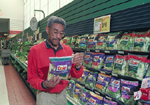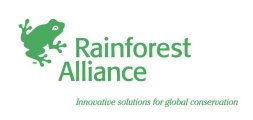|
What is a fair wage? The international Fairtrade Foundation exists to ensure a better deal for disadvantaged and marginalised third world producers. Fair trade organisations ensure decent wages, the right to join a trade union, compliance with minimum health and safety standards, no child or forced labour. Fair trade organisations bypass exploitative middlepeople and work directly with small farmer producers. They can cut costs and return a greater percentage of the retail price to the producers. Internationally agreed Fair trade criteria include ensuring a price is paid to farmers that covers the costs of sustainable production and living; and buyers pay a 'premium' that producers can invest in development. Fair trade encourages development, sustainable production practices, the continuous improvement of working conditions and investment in the welfare of workers.
The label guarantees that a fair price has been paid to the farmers and plantation workers. It also guarantees that higher social and environmental standards are being met through the payment of the 'fair trade premium'. Fairtrade Growth Fairtrade sales hit £100 m in 2004 in the UK, about 1/5 of global fairtrade - which represents 0.01% of all goods trade globally according to Guardian Special Report on FairTrade. Fairtrade coffee is growing from 5% of UK coffee in 1999 to 12% in 2002. There are nearly 200 coffee cooperatives representing 700,000 farmers (about 1 in 10) signed up to the guarnteed prices that Fairtrade provides. Kraft Foods (Maxwell House/Kenco/Carte Noire) entered into a partnership in 2003 to purchase over 5 million pounds of coffee a year from Latin American farms that have been certified as sustainably managed by:- Some companies provide their own fair trade schemes. e.g Whittard's "Fair to Farmers" coffee policy. Fair Trade Procurement Guidelines were issued by the Office of Government Commerce help departments take action under EU Procurement directives and meet fair trade objectives in public procurement. |
© 2003 EP@W Publishing Co Ltd
Photos courtesy of http://www.usda.gov

